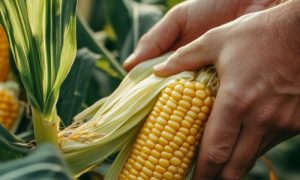US cuts forecast for corn stocks as more grain goes toward ethanol, feed

Adds details on U.S. ethanol and livestock feed use and on South American crops
By Tom Polansek
CHICAGO, April 11 (Reuters) -The U.S. Department of Agriculture trimmed its outlook for domestic corn ending stocks on Thursday as the government said more of the grain will be used to make ethanol biofuel and feed for farm animals.
Projections for U.S. corn usage increased after futures prices Cv1 fell to three-year lows this year, but global corn supplies are still considered plentiful and corn prices were trading lower after the report.
U.S. cornstocks are projected at 2.122 billion bushels by the end of the 2023-24 marketing year on Aug. 31, down from USDA’s previous forecast for 2.172 billion bushels. Analysts had expected an even bigger cutto 2.102 billion.
Stocks are still projected at a five-year high after farmers harvested a record crop in 2023 andput much of it into storage.
The USDA, in a monthly report, estimated that 5.4 billion bushels of U.S. corn will be used for ethanol, up from its March forecast for 5.375 billion. It said 5.7 billion bushels will be used for feed and other residual purposes, up from 5.675 billion in March.
“With no supply changes and use rising, ending stocks are lowered,” the USDA said.
The agency reduced its forecast for Argentina’s corn crop to 55 million metric tons from 56 million in March, below analysts’ expectations for 55.6 million.
Argentina’s Rosario grains exchange on Wednesday cut its forecast for the country’s corn harvest to 50.5 million metric tons, citing “unprecedented” damage by the spiroplasma disease carried by leafhoppers.
The USDA left its forecast for Brazil’s soybean crop unchanged at 155 million metric tons.Brazilian crop agency Conab earlier reduced its soybean output projection to 146.522 million metric tons due to adverse weather, highlighting a big divide in the outlooks.
“Overall, there’s plenty of beans out there and plenty of corn between South America and the U.S. to supply the world,” said Terry Reilly, senior agricultural strategist for Marex.
















